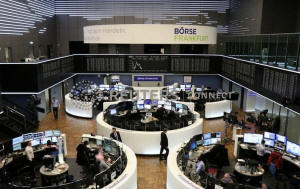|
Stock rally pauses after disappointing
China data
 Send a link to a friend
Send a link to a friend
 [February 01, 2019]
By Ritvik Carvalho [February 01, 2019]
By Ritvik Carvalho
LONDON (Reuters) - Global shares edged down
from their highest in two months on Friday as data showing shrinking
factory activity in China ended a rally that took them to their best
January on record.
Stocks have benefited this week from the U.S. Federal Reserve, which all
but abandoned plans for raising interest rates again, and on optimism
that a U.S.-China trade deal might be on the cards.
But the Caixin/Markit index of Chinese manufacturing fell to its lowest
since February 2016, adding to a growing list of economic readings
indicating slowing global growth.
(For an interactive version of the below chart, click here https://tmsnrt.rs/2Tr5cgO)
MSCI's All Country World Index, which tracks stock markets in 47
countries, came off its highest level since Dec. 4 after its best
January gain on record - up 7.79 percent on the month.
Futures indicated a timid start to trading on Wall Street.

The weak Chinese data also took MSCI's broadest index of Asia-Pacific
shares outside Japan down 0.2 percent, after a 7.2 percent gain in
January.
The Australian dollar, a barometer of investor sentiment towards China,
slid as much as half a percent. China's offshore yuan was headed for its
worst day in over five months.
Although European markets opened higher, stock fell as banks reported
poor earnings. The pan-European STOXX 600 index fell 0.2 percent.
Purchasing manager indexes in manufacturing for Italy and Switzerland
came in below expectations, although those for Germany, France and the
euro zone were in line with forecasts.
Equity markets have been relieved by a change of heart at the U.S.
Federal Reserve, which signaled this week that its three-year drive to
tighten monetary policy may be at an end as the outlook for the U.S.
economy worsens.
The Fed held rates steady, discarded its promise of "further gradual
increases" in rates and said it would be "patient" before making any
further moves.
"The Fed decision should not only be supportive of risk markets, but
also the weaker dollar backdrop could be extended, which should support
EM assets, especially at a time when China is attempting to stimulate
growth," said Mohammed Kazmi, portfolio manager at UBP.
"The market will now turn its attention to the outcome of U.S.-China
trade talks as well as the U.S. data."
Jobs data from the United States is due at 1330 GMT.
Stocks had also gained after U.S. President Donald Trump said he would
meet Chinese President Xi Jinping soon to try to seal a comprehensive
trade deal.
[to top of second column]
|

The German share price index DAX graph is pictured at the stock
exchange in Frankfurt, Germany, January 30, 2019. REUTERS/Staff

The top U.S. negotiator at the talks reported "substantial progress" in
the talks. Beijing's trade delegation said they made "important
progress", China's official Xinhua news agency reported.
The previously upbeat mood was also chilled somewhat by White House
insistence that March 1 was a hard deadline for a deal, failure of
which would lead to an increase in U.S. tariffs on Chinese goods.
"Analysts mostly remain deeply skeptical that a genuine trade deal
can be done on this time frame," economists from Commonwealth Bank
of Australia said in a note.
"We are less pessimistic since these negotiations are being
conducted by senior politicians, not by trade bureaucrats," they
said. "Both sides also have an incentive, and arguably a growing
incentive, to get a meaningful deal done."
The optimism supported Wall Street, where the S&P 500 ended Thursday
with a gain of 0.86 percent. The Nasdaq jumped 1.37 percent after a
near 11 percent rise in Facebook Inc. The Dow slipped 0.06 percent.
Over January, the S&P 500 rose 7.9 percent, its best monthly
performance since late 2015 and its strongest start to a year since
1987. The Nasdaq gained 9.7 percent in the month and the Dow rose
7.2 percent.
Against a basket of currencies, the dollar was down 0.1 percent at
95.506. The euro was 0.2 percent higher at $1.14650..
The euro weakened when Bundesbank President Jens Weidmann painted an
unusually bleak picture of the German economy, saying the slump
would last longer than initially thought.
Gold prices hovered just short of nine-month highs, supported by the
fall in bond yields and expectations for a softer dollar. Spot gold
rose 0.1 percent to $1,321.03 per ounce, having touched a top of
$1,326.30.
Oil prices were subdued as the China data offset signs major
exporters were reducing output. U.S. crude futures were flat at
$53.79 per barrel, while Brent rose 0.2 percent to $60.93. [O/R]
(Reporting by Ritvik Carvalho; additional reporting by Wayne Cole in
Sydney; editing by Janet Lawrence, Larry King)
[© 2019 Thomson Reuters. All rights
reserved.]
Copyright 2019 Reuters. All rights reserved. This material may not be published,
broadcast, rewritten or redistributed.
Thompson Reuters is solely responsible for this content.
 |